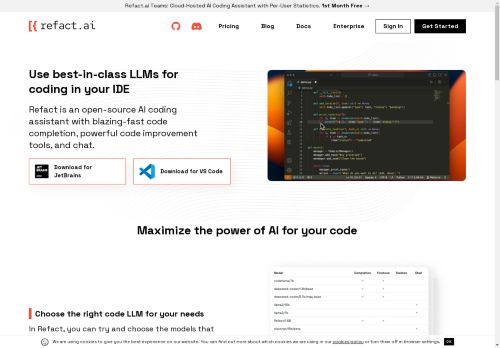
Right AI Tools
Promote this tool
About Refact
How Does It Work?
- Refact utilizes multiple deep learning models including Codex, GPT-3, CodeParrot and PaLM to analyze code context and generate suggestions.
- The 15b parameter model allows it to understand code structure and semantics to provide intelligent recommendations.
Key Features
- Code Completion - Predicts potential completions for functions, methods, variables, etc. as you type based on context.
- Refactoring - Identifies areas of code that could be improved and generates refactoring suggestions.
- Explain Code - Provides plain language explanations for unclear sections of code.
- Code Analysis - Assesses code complexity, detects potential bugs, unused variables, etc.
- Code Transformation - Converts code between programming languages.
- Chat - Answers coding questions and assists with writing code using natural language.
Use Cases and Applications
Refact can be used for:
- Increasing Developer Productivity - Its code suggestions and refactoring allows developers to code faster.
- Improving Code Quality - Refactoring and analysis helps create cleaner, more efficient code.
- Onboarding New Developers - Chat feature enables asking questions to ramp up quickly.
- Porting Code - Transformation can port code between languages like Python to Java.
- Learning to Code - Assists beginners by explaining code snippets and answering questions.
Compatiblity and integration
- Refact currently supports VS Code and JetBrains IDEs. It integrates directly within the editor for a seamless experience.
- It works with major programming languages including Python, Java, JavaScript, TypeScript, PHP, C++, C#, Ruby, Go, Rust, Swift.
On-Premise and Cloud Options
Refact offers both self-hosted on-premise and cloud-based options:
- On-Premise - Allows running models locally for maximum privacy and control.
- Cloud - Hosted option requiring no infrastructure while maintaining privacy.


